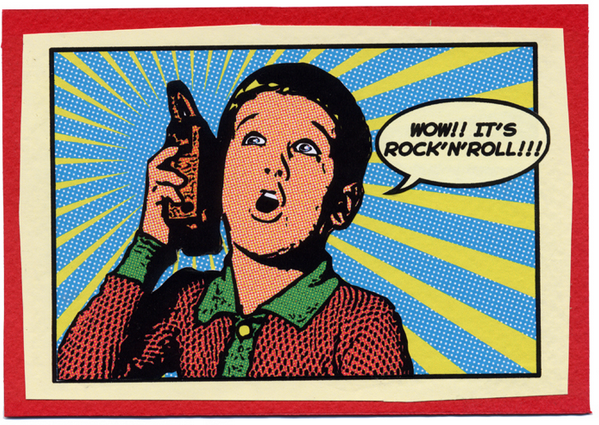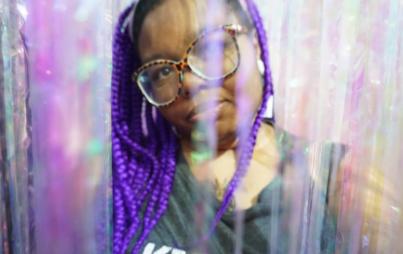
Roger that! Am I coming through loud and clear? Flickr.com
Singing songs about modern art may reference your interests. When your friend gets robbed or attacked, however, you can only have so many benefit shows before you are forced to confront the reality of your environment.
When I moved to Baltimore, Maryland in 2001 I was one of a handful of Hispanic people enrolled at the Johns Hopkins University. The kids I attended school alongside were either Caucasian, Indian, or Asian; it was a fairly international group. This aspect prevented me from reflecting too much on the idea of demographic. The school seemed like it made an effort to be somewhat of a rainbow unified under the goal of higher education.
By 2005 I had graduated and my non-work hours were spent playing music in bands. I invested more time on these endeavors than I did on my job. I don't regret that. I think that as you go through life people have to accumulate experiences to become interesting. In my view I was just accumulating experiences. I never worried because I always could just go to grad school or get a different job.
I never thought that grad school was going to be at art college nor that I was going to end up involved in running a music venue while I attended said grad school. The Maryland Institute College of Art was some remote place that the seemingly misplaced creative students from Hopkins would disappear to a few times a week. I had never seen the inside of the buildings until I found myself there in 2007 getting a sticker placed on my student ID.
How I got to school was simple. I made a video project and I applied and I got accepted. How I got to run a venue is a far more complicated story that I'll have to condense. There was a place called the Lo-Fi Social Club. It was located at 1825 North Charles Street. There was a guy who ran it with another guy. One guy disappeared from the Lo-Fi one day. He actually disappeared from town. The public address system disappeared town too. I had been running door there as a part time job with another guy I knew. We liked the Lo-Fi so we decided to keep running it. We renamed it the Hexagon because the stained glass window looked like one.
The Hexagon was a collective which we initially tried to run as a three-man staff. I roped in another friend who was a responsible human being. We all had access to the Lo-Fi's email account and that was the door revealing how over our head we were.. We learned that three men could not book a club. It was a responsibility that had to be delegated. That's how the Hexagon became a volunteer collective. That's how I became part of a scene.
Scenes by definition are restrictive; their access-only vibe is, obviously, one of their major appeals. Though Baltimore to this day possesses a seemingly nonchalant and fluid attitude about "who is in" and "who is not in," the city's music scene is still comprised—in part—by these very definitions. Because I spent 6 hours a day, four days a week for 18 months at the Hexagon I observed people. A lot. This people watching created strong impressions. These strong impressions shaped my perspective on the scene and the psychology that surrounded it.
Psychologists believe that because people exist within populations they inevitably impress upon each other their own thoughts and beliefs. Behavior is the inevitable outcome, a direct response to the thoughts and beliefs that you’re exposed to.
Everyone has a reaction to someone else's action. For example: you see someone playing music and you decide then and there that you can or can't do what they’re doing do. At least that's how it is for anyone I know who got into the game of playing music.
But that’s often a factor that's not discussed very much; I think it might be too close to saying somebody is your “role model” and as a creative person you're supposed to be a maverick; It's not cool to talk about how much influence someone else can have on your decisions.
I believe the final choice in becoming a musician is decided not by natural talent or dogged determination but by the fact that you do or do not relate to the people creating the music. To clarify, during my time in Baltimore I did not detect a racist over- or undertone to the scene—what I detected was an absence of relatable figures within it.
So that's where things began to get tricky for me. Then they stayed tricky. I was one of a handful of non-Caucasian people in a Caucasian scene. And I was definitely the only Hispanic person in the scene.
I've always believed that music is one of the few tools in life that allow a person to transcend race and talk directly to another person. However I also believe that it's necessary to at least make contact with another person who is of another culture to keep the conversation interesting and up to date. Cultural diffusion keeps the scene vital and gives the music a message—which is the most powerful thing that music can deliver.
However not every band makes music to deliver a verbal message necessarily. Volume, first and foremost, is the most immediate message you deliver as a band. When you stand in front of a stage the sheer number of amplifiers and PA speakers on stage deliver a message of sound. Between the sounds your mind may forget itself but your eyes will rove—they will ask your brain who is making the sounds.
Whether they are conscious of it or not the person making said sound on said stage is presenting a narrative. That narrative can be about themselves or about their community. About fantasy or reality. But regardless of whether you choose fantasy or reality you can’t avoid committing yourself to being an observer. To telling a narrative.
The reality of Baltimore, Maryland is violence. When the Hexagon was operational you would not want to travel a few blocks East or West of it at night alone. To do so was to roll the dice and risk becoming a random victim of robbery, assault or a target in someone else's shoot out. One night one of the club's owners was in the wrong place at the wrong time. He walked past a drug deal gone wrong. There was gunfire. One of the men running near him was shot and miraculously, my friend was not. This happened less than fifty feet from the club which is also on a main street.
Violent crime happens everywhere in Baltimore. I know more people than I care to that were either robbed at gun point, assaulted, or put into a coma. The prime targets of these crimes are people who are part of the music scene or go to art school, the art school that I attended.
Violence can be a catalyst for interesting art. With it ever-looming I somewhat expected that I would see a local band or group of people delivering the sonic equivalent of Picasso's “Guernica.”
Instead? I saw a rejection of reality. It was—apparently—much easier to forego any social commentary than I had anticipated. The average story being told was not about the reality of their surroundings. Bands in Baltimore (a notable exception being the now disbanded Double Dagger) chose fantasy over reality.
* * *
I like to think I have a good deal of experience engaging with reality in my life. Most people who have traveled outside of the United States have run into other cultures not their own. That’s where they realize that life outside of familiar borders is a world of skeptically raised eyebrows. Or that returning to the proverbial mother or fatherlands isn’t the golden ticket to the chocolate factory.
Throughout my youth I traveled to South America as a child. Bilingual and genetically Colombian as I was it never sufficed. I was not Colombian enough. I was not the “mi” in their “mi gente”.
The idea of “mi gente” or “my people” is not uniquely Colombian or South American. It is a global mentality. Many of the students I went to Johns Hopkins with were the first Indian or the first Chinese person in their family to go to an American college. They were a big deal to their family. They had gente who had expectations of them both domestically and abroad. It was not their decision whether or not to engage with culture. That decision had been made for them.
In the best case scenario, culture is a set of rules for living that parents pass down to their children. These are rules that come from generations of survival and continued family lineage. They are, perhaps, the most useful rules. They ensure deft and deferential behavior in encounters with people whose genetic and social background differs from yours. Culture can allow you to break bread with someone you've never met.
It can also be a vehicle for racism.
It is with this paradigm that I am reminded of the U2 paradox. For those who somehow do not know of the rock juggernaut that is U2, they’re an Irish band of four white guys fronted by a very opinionated singer named Bono. They rocketed to fame with a mixture of new wave music and songs about struggle observed from other cultures. In their career they have equally been admired as socially conscious rockers and condemned as colonialists.
This chagrin and chastisement however has been accompanied with the enviable skill of being a unique storyteller.
At his peak Bono could conjure emotions from stories not of his home but of other people's homes. It can be argued that this stems from celebrity, wealth and access. But access in and of itself does not create insight. I believe that insight comes from a genuine interest in other people, and in Bono's case, an emphasis on the stories of people who are not Irish.
Not all singers in bands are Bono however. They may just want to tell a simple story without grandstanding. Their narrative comes back to choosing either fantasy or reality.
In Baltimore I watched as the fantasy element of the music scene grew from a seed of charming oddness into an escapist monster.
Turning everything neon does not illuminate the night.
Singing songs about modern art may reference your interests. When your friend gets robbed or attacked however, you can only have so many benefit shows before you are forced to confront the reality of your environment.
Your interests exist only as long as you do.
Baltimore is a bi-cultural town. That is the euphemism underlying any discussion of its crime issues and economic woes.
It is a real problem and yet it doesn't have to be. I know and have observed people who do engage with other cultures in Baltimore and take their own narrative and potential impact to task. But they are in the minority. Far more stay within the physical boundaries of a campus or the boundaries of a particular scene.
For me, musicians in Baltimore have an impressive amount of creative capital to work with in making urgent art and to effect a change in an environment that needs it.
It just comes down to a matter of whether they choose to accept reality now or later.







